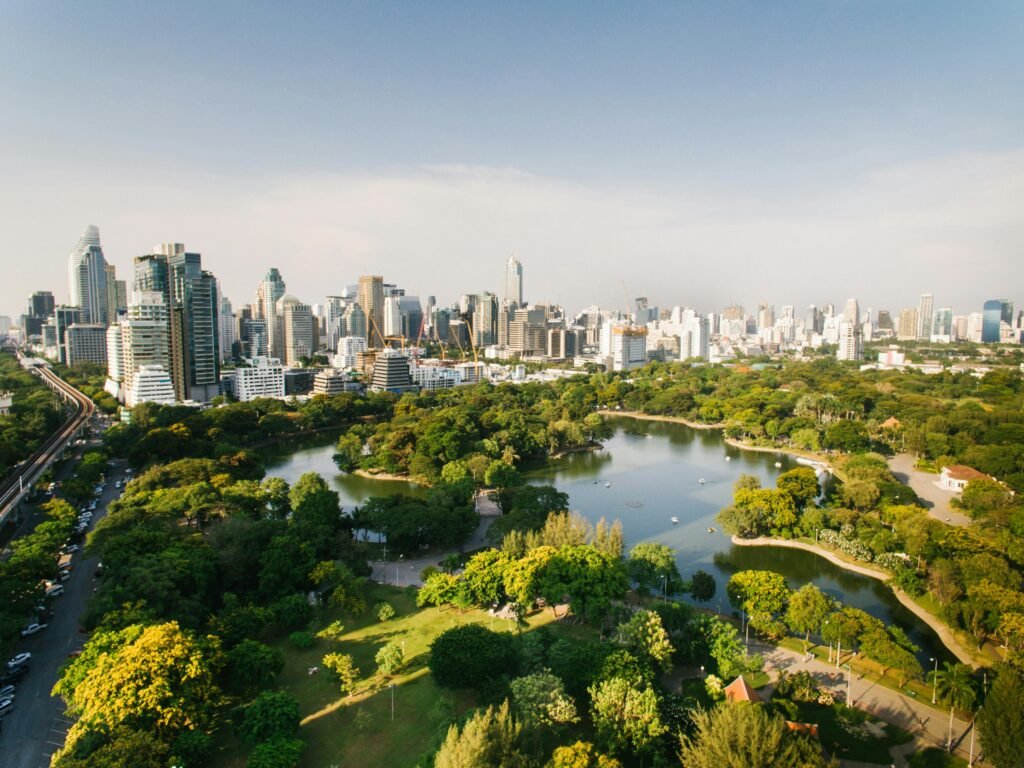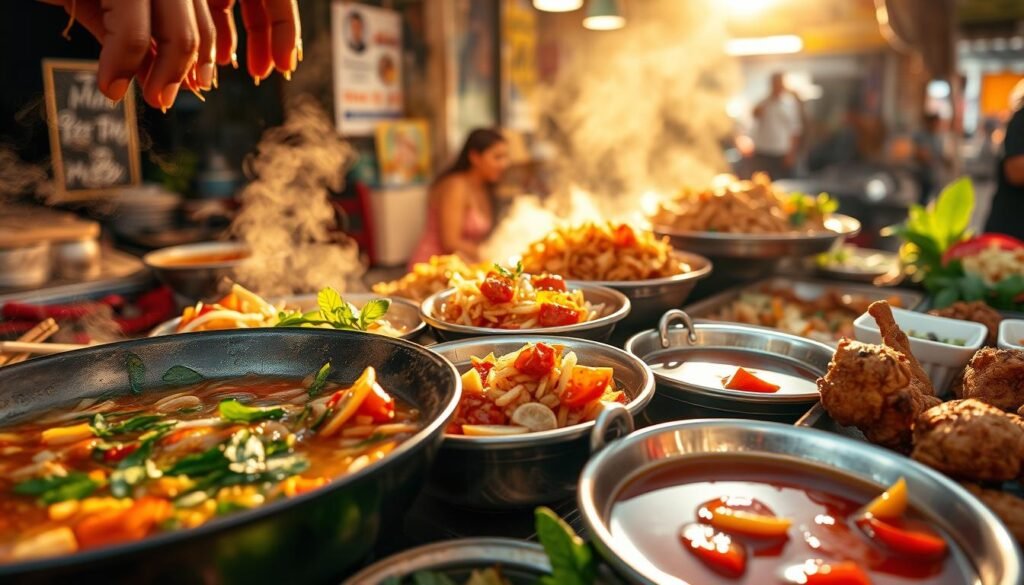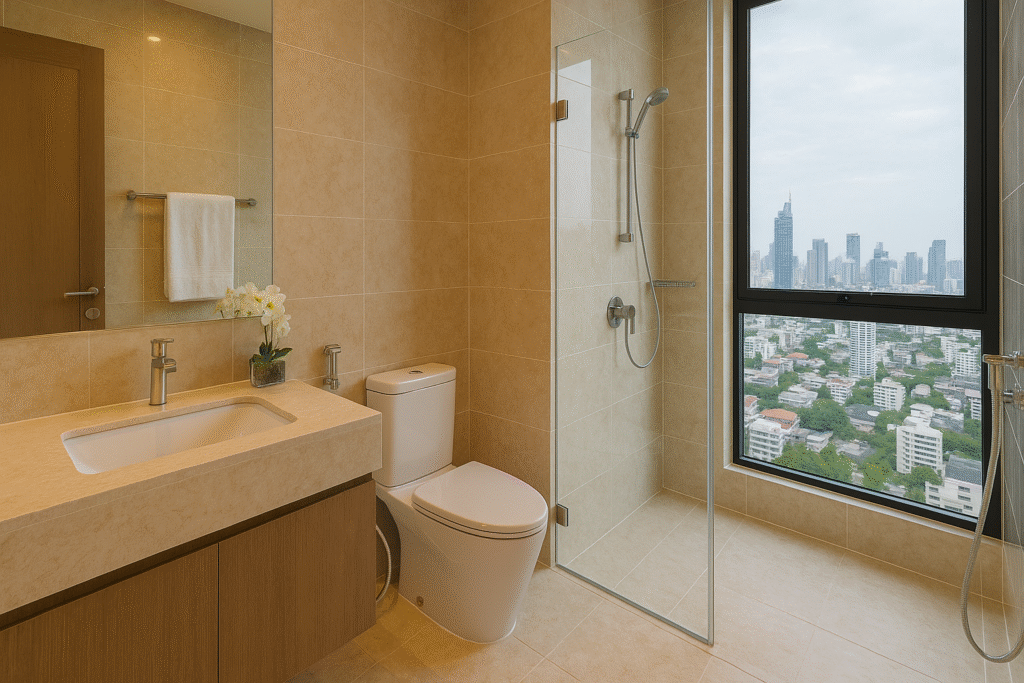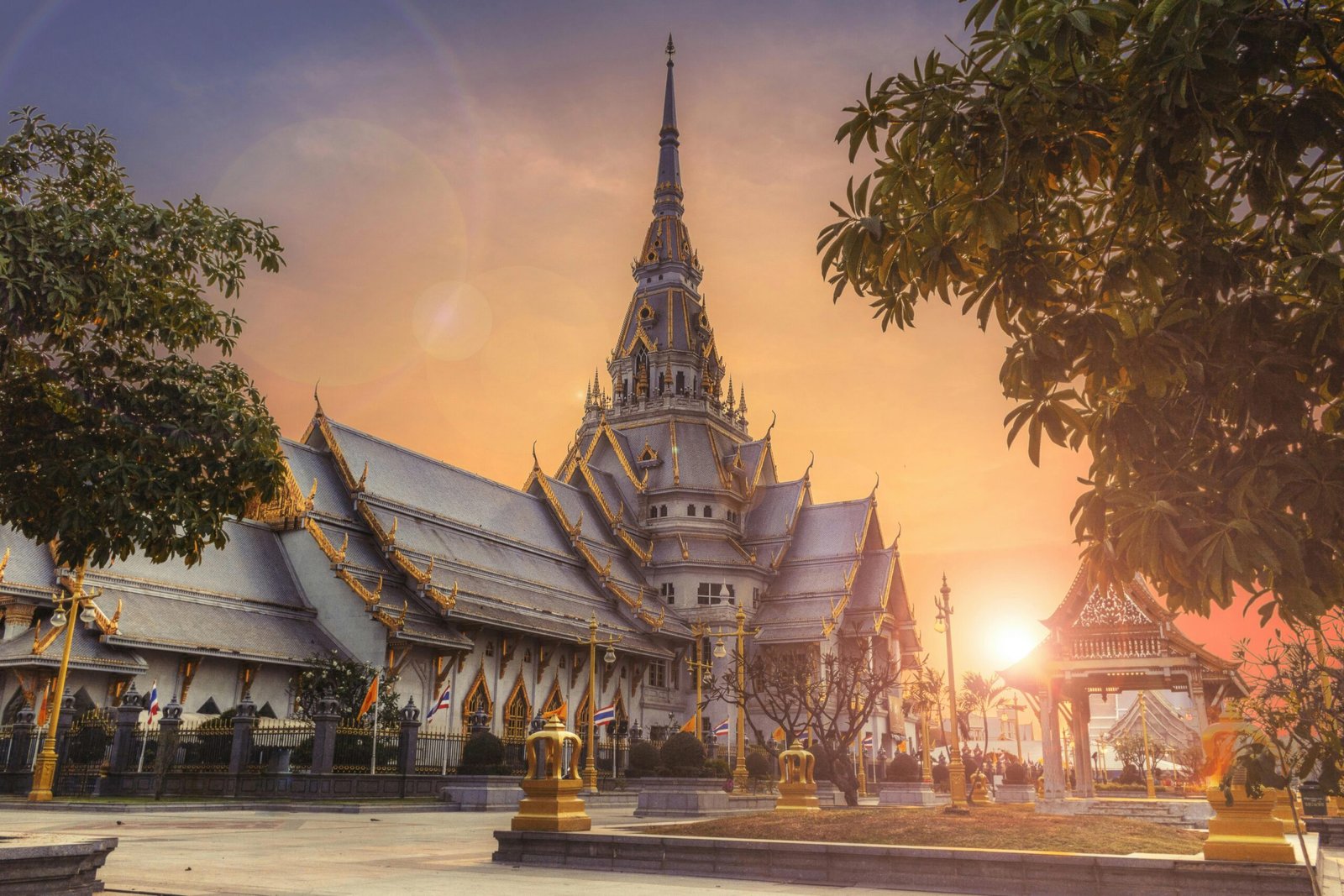
Picture this: You’re standing in a Bangkok street market at 6 AM, sweating through your sensible M&S polo shirt, while a vendor enthusiastically offers you deep-fried scorpions for breakfast. Your British instincts scream “queue politely and apologize,” but there’s no queue in sight, and somehow you’re the one apologizing to the scorpions.
Welcome to Thailand through British eyes – where everything you thought you knew about social etiquette gets turned upside down, and your biggest cultural challenge might just be learning when not to say sorry.
After spending six months navigating the beautiful chaos of Thailand (and making every possible cultural blunder along the way), I’ve compiled this brutally honest guide to help fellow Brits prepare for the delightful culture shock that awaits. From mastering the art of the wai to surviving your first som tam, here’s everything I wish someone had told me before I landed in the Land of Smiles.
The Great British Apology Crisis
When Sorry Actually Makes Things Worse
The first thing you’ll notice as a Brit in Thailand? Your automatic apology reflex becomes hilariously inappropriate. I spent my first week apologizing to tuk-tuk drivers for them trying to overcharge me, to street vendors for not buying their goods, and memorably, to a temple monkey for it stealing my banana.
The Thai approach: Direct but respectful communication without the constant self-deprecation we Brits are famous for.
What works: Learn basic Thai phrases like “mai pen rai” (no problem) instead of defaulting to “sorry” for every minor interaction.
Cost-saving tip: Stop apologizing for not buying things immediately – Thai vendors expect negotiation, and your British politeness might actually offend by suggesting you’re just being patronizing.
The Wai: More Complex Than Cricket Rules
Mastering the traditional Thai greeting (the wai) makes British etiquette look simple. Forget everything you know about handshakes and awkward small talk.
The basics:
- Palms together, fingers pointing up
- Higher hands = more respect
- Never wai service workers (they wai you first)
- Always wai monks, elderly people, and anyone clearly senior
My embarrassing moment: I enthusiastically wai-ed a 7-Eleven cashier who looked mortified, then spent five minutes apologizing (see problem above) while a queue of locals watched in bewildered amusement.

Food Culture Shock: Beyond Fish and Chips
Breakfast at 35°C: A British Nightmare
Thai breakfast culture will challenge everything you believe about the most important meal of the day. Forget your lukewarm beans on toast – Thais eat spicy soup at 6 AM while it’s already 30°C outside.
Popular Thai breakfast options:
- Jok (rice porridge): ฿25-40 per bowl
- Khao tom (rice soup): ฿30-50
- Thai-style omelets: ฿40-60
British survival strategy: Start with khao kriab (coconut rice cakes) or fruit – gentler introduction to morning heat and spice.
The Great Chopstick Confusion
Here’s something that will blow your British mind: Most Thai food isn’t eaten with chopsticks. I spent my first week struggling with noodles using chopsticks while locals watched me fumble, too polite to mention that Thais primarily use forks and spoons.
Thai dining etiquette:
- Fork in left hand (pushing), spoon in right hand (eating)
- Chopsticks mainly for Chinese-Thai dishes
- Never put the fork in your mouth
- Sharing dishes is expected – order variety for the table
Street Food: Conquering British Health and Safety Fears
British food safety training becomes your worst enemy in Thailand’s incredible street food scene. That vendor with the questionable-looking cart might serve the best pad thai of your life.
Street food safety tips:
- Look for high turnover (busy stalls = fresh food)
- Watch for locals eating there
- Stick to thoroughly cooked items initially
- Avoid ice in drinks unless from reputable places
Budget breakdown:
- Street food meals: ฿40-80 (£1-2)
- Local restaurant: ฿100-200 (£2.50-5)
- Tourist restaurant: ฿300-500 (£7.50-12.50)
Social Situations: When British Reserve Meets Thai Warmth
The Personal Space Paradigm Shift
British social distancing (the original kind) doesn’t exist in Thailand. Prepare for friendly strangers asking about your salary, age, and marital status within minutes of meeting – questions that would send most Brits running for the nearest pub.
Thai social norms:
- Personal questions show interest, not rudeness
- Age determines social hierarchy and language use
- Discussing money isn’t taboo
- Physical affection between friends is normal
The Smile Interpretation Challenge
Thai people smile for dozens of reasons that have nothing to do with happiness – confusion, embarrassment, disagreement, or simple politeness. As Brits, we’re used to smiles meaning “I’m pleased to meet you” or “I fancy a cup of tea.”
Different types of Thai smiles:
- Yim thang nam ta (tearful smile): Embarrassed or sad
- Yim thak thai (I-know-you’re-lying smile): Skeptical
- Yim sao (sad smile): Pity or sympathy
- Yim cheun chom (admiring smile): Genuine appreciation
Temperature Shock: When 40°C Becomes Normal
Dressing for Success (Without Fainting)
British summer preparation does not prepare you for Thai heat. I arrived with my trusty cargo shorts and cotton t-shirts, confident in my festival-going experience. Within hours, I looked like a melted snowman.
Thai climate survival guide:
- Fabrics: Linen, bamboo, moisture-wicking synthetics
- Colors: Light colors reflect heat better
- Layers: Bring a light jacket for over-air-conditioned spaces
- Footwear: Breathable shoes you can easily remove
Monthly temperature guide:
- Cool season (Nov-Feb): 20-30°C – Perfect for Brits
- Hot season (Mar-May): 35-40°C – Survival mode
- Rainy season (Jun-Oct): 25-35°C but humid – Like being in a greenhouse
The Air-Con Addiction Cycle
Thai buildings compensate for external heat with arctic air conditioning. You’ll cycle between tropical heat and Antarctic cold every time you enter a building, mall, or transport.
Preparation tips:
- Always carry a light sweater
- Expect 18-20°C indoors when it’s 38°C outside
- Hotels often keep rooms at freezing temperatures
- Bring layers for cinema visits (seriously cold)
Transport Culture: Beyond the 8:15 to Paddington
Tuk-Tuk Negotiations: A Master Class
Forget polite British queuing – tuk-tuk rides require negotiation skills that would make a market trader proud. Your natural inclination to accept the first price quoted will mark you as an easy target.
Tuk-tuk survival guide:
- Always negotiate before getting in
- Expect to pay 2-3x local price initially
- Counter with 50% of their first offer
- Have small bills ready
- Know your destination in Thai
Price comparison (Bangkok):
- Tuk-tuk: ฿100-300 for short rides
- Taxi: ฿60-200 (use meter)
- BTS/MRT: ฿16-59 per journey
- Motorbike taxi: ฿20-60 for short distances
Songthaew Etiquette: The Shared Transport Mystery
Songthaews (red trucks with benches) operate on unwritten rules that no British person instinctively understands. I spent my first ride wondering when someone would check my ticket.
Songthaew basics:
- No fixed stops – ring the bell when you want off
- Pay when you exit
- Squeeze in wherever there’s space
- Help others with heavy bags
- Price: Usually ฿10-30 per person
Religious and Cultural Sensitivity
Temple Visits: More Rules Than Wimbledon
Thai temples have dress codes that make British formal wear seem casual. Your holiday wardrobe likely won’t cut it.
Temple dress code:
- Shoulders covered: No tank tops or sleeveless shirts
- Long pants/skirts: No shorts, mini-skirts, or revealing clothing
- Closed shoes: Easy to remove for temple buildings
- Modest colors: Avoid bright, flashy outfits
Temple behavior:
- Remove shoes before entering buildings
- Never point feet toward Buddha images
- Don’t climb on statues for photos
- Keep voices low and respectful
- Women cannot touch monks
The Monarchy: Ultimate Respect Required
Thai reverence for the monarchy goes far beyond British royal protocol. What might be acceptable royal commentary in a British pub could land you in serious legal trouble in Thailand.
Key points:
- Never criticize the royal family
- Stand for royal anthem in cinemas
- Handle money respectfully (it bears royal images)
- Show respect during royal ceremonies
- Avoid stepping on coins or notes
Money Matters: Budgeting Beyond the Pound
The Tipping Confusion
British tipping culture doesn’t translate directly to Thailand. Over-tipping marks you as a tourist, while under-tipping can seem rude.
Thai tipping guide:
- Restaurants: 10% for good service (not mandatory)
- Street food: Round up to nearest ฿5-10
- Taxis: Round up fare
- Massages: ฿50-100 tip
- Hotels: ฿20-50 for housekeeping
ATM Strategy: Avoiding Fee Shock
Thai ATM fees can shock British travelers used to free cash withdrawals. Plan your cash strategy carefully.
ATM tips:
- ฿220 fee per withdrawal at most banks
- Withdraw maximum amounts to reduce fee frequency
- Notify your UK bank before traveling
- Keep receipts for exchange rate tracking
- Some hotels offer better exchange rates than banks
Language Barriers and Breakthroughs
Essential Phrases Beyond “Hello”
“Sawasdee” only gets you so far. Here are the phrases that actually solve problems:
Survival Thai:
- “Mai kao jai” (Don’t understand) – Use constantly
- “Tao rai?” (How much?) – Essential for everything
- “Mai ao” (Don’t want) – Polite refusal
- “Aroi mak” (Very delicious) – Makes vendors happy
- “Chuay dai mai?” (Can you help?) – Opens doors
Translation App Reality
Google Translate becomes your best friend, but Thai script recognition isn’t perfect. Download offline translations and learn to use the camera feature for menus.
Shopping Culture: Haggling for Brits
Market Negotiations: Beyond “That’s a Bit Dear”
British shopping politeness (“I’ll think about it”) doesn’t work in Thai markets. Vendors expect engagement and negotiation.
Haggling strategy:
- Show genuine interest
- Ask for “best price”
- Counter with 50-60% of quoted price
- Be prepared to walk away
- Split the difference
Market timing:
- Early morning: Fresh products, better prices
- Late evening: Vendors want to clear stock
- Weekdays: Less crowded, more negotiation room
Accommodation Culture Shock
Guesthouse vs. Hotel Expectations
British B&B standards don’t apply to Thai budget accommodation. That ฿300 (£7.50) room might have quirks that test your adaptability.
Budget accommodation reality:
- Shared bathrooms often include bucket showers
- Air-con might be extra cost
- “Hot water” could mean lukewarm
- Noise levels higher than British standards
- Bedding changed weekly, not daily
Price ranges:
- Hostel dorm: ฿300-600 per night
- Budget private room: ฿500-1,200
- Mid-range hotel: ฿1,500-3,000
- Luxury resort: ฿5,000+ per night
Health and Safety: Beyond NHS Expectations
Pharmacy Culture: Self-Diagnosis Paradise
Thai pharmacies stock medications available only by prescription in the UK. Your responsible British approach to medication meets Thai self-service healthcare.
Pharmacy tips:
- Antibiotics available without prescription
- Bring generic drug names, not brand names
- Pharmacists often speak English
- Prices much lower than UK
- Keep receipts for insurance claims
Healthcare Costs: Shocking Affordability
Thai healthcare costs will amaze British travelers used to NHS fees and private healthcare prices.
Typical costs:
- Doctor consultation: ฿500-1,500 (£12.50-37.50)
- Dental cleaning: ฿800-1,500 (£20-37.50)
- Prescription medications: 60-80% cheaper than UK
- Private hospital treatment: Fraction of UK private costs
Weather Patterns: Beyond “Bit Nippy”
Rainy Season Reality
British rain experience doesn’t prepare you for Thai monsoons. When Thais say “rainy season,” they mean business.
Rainy season survival:
- Intensity: Biblical downpours, not British drizzle
- Duration: Can rain for hours, then stop completely
- Frequency: Daily afternoon storms
- Impact: Streets flood, transport stops
- Preparation: Waterproof everything, not just jacket
Hot Season Shock
British heatwave preparation (shorts and complainting) won’t work for Thai hot season temperatures.
Hot season strategy:
- Plan indoor activities for 11 AM – 4 PM
- Carry water constantly
- Seek shade and air-con regularly
- Adjust expectations for outdoor sightseeing
- Consider traveling to cooler regions (north/mountains)
Cultural Events and Festivals
Songkran: Water Fight Survival Guide
Songkran (Thai New Year) turns the entire country into a massive water fight. British reserve meets complete chaos.
Songkran preparation:
- Waterproof everything: Phone, money, passport copies
- Dress appropriately: Quick-dry clothes, secure footwear
- Join in or hide: There’s no middle ground
- Respect rules: Gentle soaking, not aggressive dousing
- Dates: Usually April 13-15
Safety tips:
- Avoid motorbikes during festival
- Protect electronics completely
- Don’t drink tap water used in water fights
- Keep important documents secure
Long-term Culture Adaptation
The Gradual Shift
After three months, you’ll notice subtle changes in your British behavior:
- Less apologizing, more direct communication
- Increased spice tolerance
- Natural removal of shoes indoors
- Comfortable with closer personal space
- Expectation of affordable, fresh food
What Never Changes
Some British traits prove surprisingly persistent:
- Queuing instincts (confusing in markets)
- Weather conversation starters (less relevant)
- Pub closing time expectations
- Sunday roast cravings
- Sarcasm (often lost in translation)
Practical Preparation Checklist
Before You Leave the UK
Essential preparations:
- Notify banks of travel plans
- Get travel insurance covering activities
- Research visa requirements
- Download offline maps and translation apps
- Pack appropriate clothing for temples
Health preparations:
- No mandatory vaccinations required
- Consider hepatitis A/B, typhoid, Japanese encephalitis
- Bring prescription medications in original containers
- Pack basic first aid supplies
- Research nearest hospitals at destination
First Week Survival Kit
Cultural adaptation tools:
- Phrase book or translation app
- Lightweight cardigan for air-con
- Respectful temple clothing
- Comfortable walking shoes
- Portable water bottle
- Hand sanitizer
- Small bills for tips and street food

Regional Differences: Not All Thailand is Bangkok
Northern Thailand (Chiang Mai)
- Cooler temperatures year-round
- More conservative dress expectations
- Hill tribe cultural sensitivity required
- Better English in tourist areas
- Different food specialties (khao soi, sai ua)
Southern Islands
- More relaxed beach culture
- Higher tourist prices
- English widely spoken
- Different cultural norms on beaches
- Monsoon seasons vary by coast
Isaan (Northeast)
- Most authentic Thai culture
- Least English spoken
- Spiciest food in Thailand
- Lowest tourist prices
- Greatest cultural immersion opportunity
Technology and Communication
Internet and Wi-Fi Culture
Thai internet culture differs significantly from UK broadband expectations.
Connectivity tips:
- Free Wi-Fi almost everywhere
- Internet cafes still common (฿20-40/hour)
- Mobile data very affordable
- Social media usage patterns different
- VPN might be useful for UK streaming services
Mobile Phone Strategy
Options for UK travelers:
- UK roaming: Expensive but convenient
- Thai SIM card: ฿100-300, much cheaper data
- Pocket Wi-Fi rental: Good for groups
- Hotel Wi-Fi only: Budget option but limiting
Common British Mistakes and How to Avoid Them
The Biggest Culture Clash Moments
- Over-apologizing: Makes Thais uncomfortable
- Refusing food offerings: Considered rude
- Showing sole of foot: Highly offensive
- Public displays of anger: Causes loss of face
- Inappropriate temple behavior: Serious cultural violation
Recovery Strategies
When you inevitably make cultural mistakes:
- Learn from locals’ reactions
- Ask Thai friends for feedback
- Observe before acting in new situations
- Stay humble and willing to adapt
- Remember mistakes are learning opportunities
Budget Reality Check
Daily Budget Breakdown (British Perspective)
Backpacker budget (฿800-1,200/day = £20-30):
- Accommodation: ฿300-500
- Food: ฿200-400 (street food/local restaurants)
- Transport: ฿100-200
- Activities: ฿200-300
Mid-range comfort (฿2,000-3,500/day = £50-87.50):
- Accommodation: ฿1,000-1,800
- Food: ฿600-1,000 (mix of local and tourist restaurants)
- Transport: ฿300-500 (taxis, tours)
- Activities: ฿500-800
Luxury experience (฿5,000+/day = £125+):
- Accommodation: ฿3,000+
- Food: ฿1,500+ (hotel restaurants, fine dining)
- Transport: ฿500+ (private cars, flights)
- Activities: ฿1,000+ (private tours, spas)
Final Thoughts: Embracing the Beautiful Chaos
Thailand will challenge every assumption you have about how the world works. Your British sensibilities will be tested, stretched, and ultimately enriched by the experience. The key isn’t to resist the culture shock – it’s to lean into it with humor, humility, and an open mind.
Yes, you’ll make embarrassing mistakes. You’ll sweat through clothes you thought were appropriate. You’ll accidentally offend someone despite your best intentions. And you’ll have the most transformative travel experience of your life.
The Thailand that initially seems chaotic and overwhelming becomes a place of incredible warmth, generosity, and joy. Those confusing social interactions become meaningful connections. The overwhelming heat becomes an excuse to slow down and savor life. The spicy food becomes an addiction you’ll crave long after returning to Britain.
Your Next Steps
Ready to embrace your own Thai culture shock adventure? Here’s how to start preparing:
- Book your flight: Best deals typically 2-3 months in advance
- Get travel insurance: Essential for Southeast Asia travel
- Start learning basic Thai phrases: Even attempts are appreciated
- Research your destinations: Each region offers different experiences
- Connect with other British expats: Facebook groups and forums offer real advice
Useful resources:
- Thai Embassy London: Official visa information
- Thaivisa.com: Expat community and advice
- Bangkok Post: English-language news
- 12Go.asia: Transport booking across Thailand
The culture shock isn’t something to endure – it’s the whole point of the adventure. Every awkward moment, every miscommunication, every time you feel completely out of your depth is exactly where the magic happens.
So pack your sense of humor alongside your mosquito spray, leave your British reserve in the departure lounge, and prepare for the most wonderfully disorienting experience of your life. Thailand is waiting to challenge everything you think you know about the world – and show you something infinitely more beautiful in return.
Safe travels, and may your culture shock be as educational as it is entertaining!

